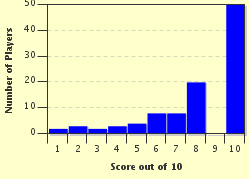Quiz Answer Key and Fun Facts
1. My name at birth was Alexandrina.
2. I was an English rose who brought inspiration to people's gardens.
3. "You must allow me to tell you how ardently I admire and love you."
4. I was the first person to portray Agatha Christie's Miss Marple.
5. I was killed by a horse called Anmer.
6. I quietly walked the corridors with a little lamp in my hands.
7. I managed my Victorian household very successfully.
8. My principal roles included Giselle from Swan Lake.
9. I made many new friends in Newgate Prison.
10. I flew "Jason" from Britain to Australia.
Source: Author
Plodd
This quiz was reviewed by FunTrivia editor
bloomsby before going online.
Any errors found in FunTrivia content are routinely corrected through our feedback system.

